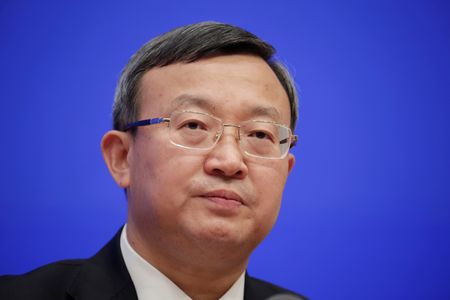BEIJING (Reuters) -China can achieve positive foreign trade growth in the second half of 2022 despite slowing external demand, Vice Commerce Minister Wang Shouwen said on Tuesday, amid growing pressure to stabilise its import and export flows.
Foreign trade, the last reliable pillar of the world’s second-largest economy as it struggles with COVID-19 outbreaks, weak consumption and a property crisis, is losing momentum as demand wanes at home and abroad.
August trade data shows that the weakening external demand remains the biggest uncertainty for China’s foreign trade, as the economic growth of Europe and the U.S. slowed and orders for Chinese trade firms declined, Wang said at a press conference in Beijing.
In order to stabilise the sector, the ministry on Tuesday released measures, including supporting firms’ order delivery and encouraging some regions to explore second-hand auto exports.
The online exhibition of the 132nd China Export and Import Fair, or Canton Fair, will be expanded from 10 days to five months, said the ministry.
China will lower port dues on cargo priced by the government by 20% in the fourth quarter and vowed to keep normal operation of ports and freight depots, state media quoted the cabinet as saying last week.
“With these policy supports and the sound foundation of China’s foreign trade, we are confident that the sector will achieve positive growth in the second half of this year despite slowing external demand,” Wang said.
Exports rose 7.1% in August from a year earlier, slowing from an 18% gain in July and marking the first slowdown since April, official data showed.
The slowdown in trade is rippling through workshops across eastern and southern China’s manufacturing hubs, in industries from machinery parts and textiles to high-tech home appliances, where businesses are scaling back while export orders dry up.
(Reporting by Ellen Zhang and Ryan Woo; Editing by Kirsten Donovan and Christian Schmollinger)





